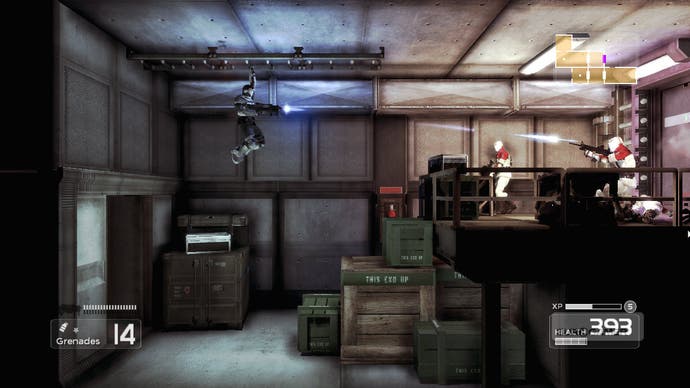Shadow Complex
There's something following me.
Ever dropped a stone into a hole to find out how deep it goes? Had Jason Fleming done so while peering into the overgrown hollow that marks the start of Shadow Complex, no splash would have echoed back. This opening, into which his girlfriend descended not two minutes earlier, is the mouth of an abyss; a rabbit hole that will lead him unwittingly into an underground military complex, the role of would-be national saviour and the belly of one of gaming's long lost genres. By the time he re-emerges, triple-jumping into the sun, you'll have mapped tens of miles of subterranean corridors, thwarted a plot to blow up San Francisco and seen Jason Fleming transformed from country-bumpkin into cyber-ninja.
Shadow Complex is Super Metroid re-imagined by J.J.Abrams. Its story is pulp thriller, throwing an ordinary Joe into extraordinary circumstances under which he stiffens implausibly into a one-man army. Fleming is an all-American action hero, hurling grenades and missiles with thoughtless abandon one moment; creeping death through ventilation shafts in search of his snatched girlfriend the next. "You don't look like the kind of guy who'd pull the trigger," challenges one enemy he meets. Two seconds later, as Fleming steps over a puddle of warm, Unreal Engine-pumped blood, you can almost hear Mark Rein in the background, fist-pumping the air to chants of: "USA! USA!"
But for all its Hollywood bombast, Shadow Complex is born from nothing but the purest of Japanese pedigrees. For once the Super Metroid reference isn't a lazy critic's crutch. Epic Games has always declared its intention to resurrect the classic 2D side-scrolling exploration game, once popularized by Nintendo's seminal space adventure, later perfected by Konami's Castlevania: Symphony of the Night. So while Shadow Complex's story and setting may be popcorn nonsense, the mechanics they clothe are golden.

In reviving a genre that the Japanese left for dead, the game offers a telling snapshot of the global games industry in 2009. Here is an American developer so emboldened by recent successes that it feels qualified to reimagine one of Japan's sacred classics. It's like Bungie sat down to remake Super Mario. Unthinkable. Yet somehow, the gambit's paid off. In fusing classic game design with contemporary techniques and sensibilities, Epic Games and Chair Entertainment have triumphed where Japanese developers continue to flounder. The result is nothing short of one the best games of this generation.
Despite appearances, Shadow Complex remains a 2D game at heart. The shift to 3D visuals adds depth to the world, and allows for a few flamboyant perspective-shifting set-pieces, but Fleming's movements are restricted to up, down, left and right. Bullets automatically fire off into the Z-axis if an enemy's standing in the background, but otherwise their trajectory moves in arcing step with your analogue-stick sweeps.
At the surface level, this is a pure action game: choke out guards with the B-button, leap electric fences with the A-button, Rambo your way up staircases of enemies with a squeeze of the triggers. But like those titles it so carefully apes, it's also a cartography game, challenging players to map every corner and crevice of the base in search of that 100 per cent badge of completion. Locked doors and obstacles hinder access to the base. But rather than asking you to locate keys to unlock these areas, you must instead find the power-ups that allow Fleming to overcome each type of blockage. Until you pick up the missile attachment for your gun, for example, every area closed off by an object that can only be destroyed by missiles remains off-limits. Shine your flashlight on an object and it'll glow the colour of the power-up needed to destroy it: orange for bullets, green for grenades, purple for foam and so on. Until you have the relevant power-up, all instances of that object will be impassable, allowing the designers to carefully drip-feed access to the sprawling complex.




